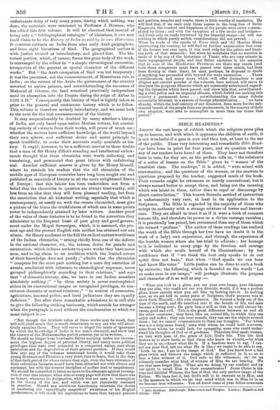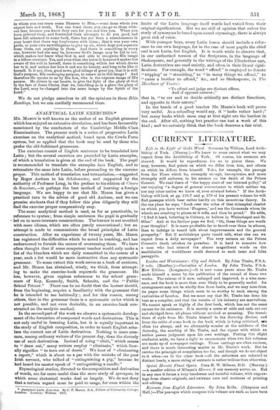BIBLE READINGS.* Astrnsr the vast heaps of rubbish which the
religious press piles
up to heaven, and with which it oppresses the children of earth, it is not wonderful if a gem is now and then lost, at least to the use of the public. These very interesting and remarkable Bible Read- ings have been in print for four years, and we question whether any of our readers have heard of them. They have not therefore been in vain, for they are, as the preface tells us, " the substance
of a series of lessons on the Bible " given to " women of the humblest class. The readings," it is added, " were mixed with conversation ; and the questions of the women, or the answers to questions proposed by the teacher, suggested much of the book. Their remarks might be erroneous or merely conventional, but it always seemed better to accept them, and bring out the meaning which was latent in them, rather than to repel or discourage by direct contradiction." This honest Socratic method of instruction is unfortunately very rare, at least in its application to the Scriptures. The Bible is regarded by the majority of those who accept its authority with a strange mixture of terror and irrever- ence. They are afraid to treat it as if it were a book of common human life, and therefore its power as a divine message vanishes ; it is practically less prized, less reverenced than any of those which are termed "profane." The author of these readings has realized the worth of the Bible through her (we have no doubt it is the work of a lady) own experience, and through the experience of
the humble women whom she has tried to educate ; her homage to it is indicated in every page by the freedom and courage with which she avails herself of its illuminations ; by her confidence that if " we think the book only speaks to us our spirit does not hear," that when " God speaks we can hear
and know His voice." Little justice can be done to such a book
by extracts ; the following, which is founded on the words " Let Us make man in our image," will perhaps illustrate the purpose
and character of it as well as any :-
"When you look in a glass you see yoar own imago, your likeness Any one else, who could not see you directly, would, if it was a perfect glass, know exactly what you are like by looking into it. In making man, as we are told in many parts of Scripture, God's purpose was to show forth Himself,—His own character. He formed a body out of the dust of the earth, and He breathed into it the breath of life, and man became a living soul ; He gave him a will, so that he could choose be- tween good and evil. This is the great difference between us and all the other creatures ; they have, like us, animal life, in which they can enjoy and suffer ; they can hear sounds, they can see the objects around them ; but we cannot communicate to them our thoughts. ' For Adam was not a help-meet found,' none with whom he could hold converse, none from whom he could look for sympathy, none who could under- stand his thoughts of God or of goodness. Therefore God made woman, an heir with man of the grace of Life, God's life. This life God desires us to show forth, so that those who know us should,—by what they see in us,—know what He is. If a heathen were to say, 'I can- . not see your God, tell me what He is like ;' we ought to be able to say, 'Look on me; I am in the imago of God.' But you know how a bad glass twists and distorts the image which is reflected in it, so as to bear a false witness of it. God calls us His witnesses; oh ! let us solemnly consider what kind of witness of Him we are bearing. We see that men forget Him. What are we doing, by our conduct and by our spirit, to recall Bins to their remembrance? Jesus Christ is the true and faithful Witness, the Son of God, the only perfect image of the Father. We have lost it, but God's will is to recreate us in Him, and in the measure in which we let that mind which was in Him be in us we become true witnesses. You all know some of your fellow-creatures
* Bible Rtadings. Edinburgh: Edmonton and Douglas. London: Hamilton and Adams. 1864.
in whom you can trace some likeness to Him,—some from whom you expect love and truth. You can trust them, you can go to them with- out fear, because you know they care for you and love you. When you have grieved them, and frustrated their attempts to do you good, and have felt ashamed to come back, there has yet been a consciousness in your heart that there was forgiveness with them ; that it was your own pride, or your own unwillingness to give up sin, which kept you separate from them, not anything in them. And there is something in every one, however bad she may be, however God's image may be hid in her which makes her know what God is, and able to recognize His image in a fellow-creature. Yes, and even when she hates it, because it makes her aware of the evil in herself, there is something within her which draws her to it, and makes her love it and see its beauty, and long to be like it herself. Is it not, then, good news, glad tidings of great joy, that it is still God's purpose, His unchanging purpose, to renew us in this image ? And therefore He speaks to us by His Son, who is the express image of His person. He shines in our hearts, to give the light of the glory of God in the face of Jesus Christ, that we, beholding as in a glass the glory of the Lord, may be changed into the same image by the Spirit of the Lord."
We do not pledge ourselves to all the opinions in these Bible Readings, but we can cordially recommend them.































 Previous page
Previous page